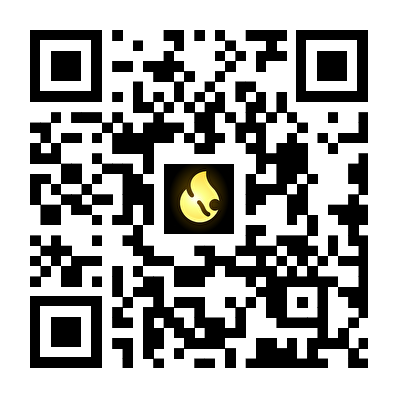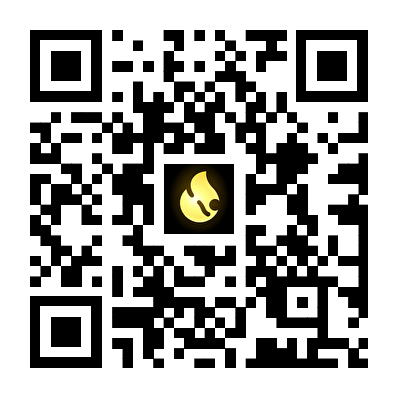Without paying attention to what you eat, it's easy to develop bad eating habits. Lack of meals, excess or deficiency of carbs, fats, and proteins can lead to weight issues, fatigue, or chronic diseases. Most people are not conscious of their calorie consumption and miss essential nutrients, which makes it more challenging to maintain their health.
This is where a nutrition tracker will be necessary to provide you with an organized approach to tracking meals and calculating calories. In this article, we will talk about the significance of nutrition trackers and how they can help you improve your diet.
In this article
Part 1. What Is a Nutrition Tracker
A nutrient tracking app helps individuals track their daily food intake. Most of the modern trackers feature the option of photo or barcode reading and customized goal settings. It is a valuable resource for forming healthier habits, learning about nutrition, and maintaining a balanced diet.
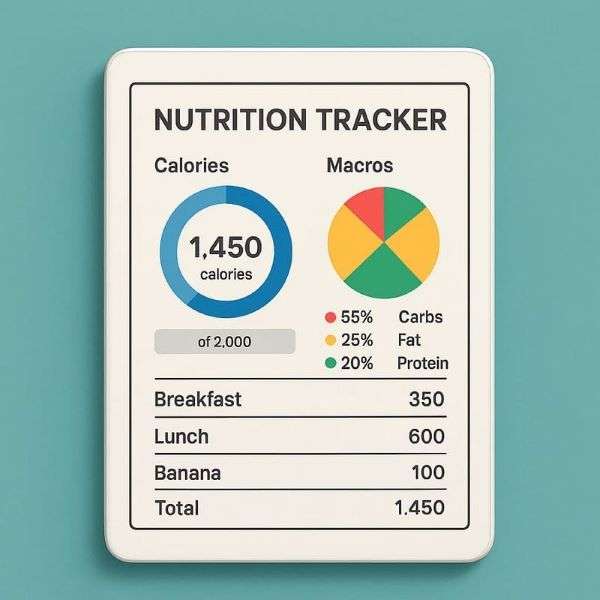
Nutrition trackers provide the structure and data to achieve the consistency you require to remain accountable to your goals. This makes it a highly valuable application for everyone who wishes to improve their health and lifestyle.
Part 2. Why You Need a Nutrition Tracker in Daily Life
Being aware of what the nutrition tracker is about is quite crucial once you jump into keeping track of your calories. To get a better understanding, here are some of the use cases where a nutrient tracking app can be used as a support system:
- Weight Management: This will help you maintain a healthy balance of calories to aid in losing or maintaining your weight.
- Fitness Goals: It would be used to monitor protein and nutrient levels to support muscle building, endurance, or sporting performance.
- Healthy Habits: Establishing regularity in meal timing and portion size can help reduce unhealthy snacking.
- Medical Support: An app that tracks nutrients is helpful when patients with diabetes or hypertension are interested in checking their nutrient intake.
- Mindful Eating: You can use it to be more conscious of what you eat, to make smarter food choices every day.
- Progress Tracking: Monitor dieting patterns with time to keep track of progress and readjust goals.

Part 3. 10 Best Nutrition Tracker Apps in 2025
Moving on, you now have a clear view of the usage of a food nutrition tracker, leaving you to choose an app that meets your needs. In this section of the article, we are discussing the shortlisted top 10 nutrition trackers you can depend on in your weight gain/loss journey:
1. CalBye [iOS/Android]
CalBye is a high-tech AI-based nutrition tracker that helps streamline the process of logging meals. It helps in enhancing your eating patterns for a healthy lifestyle. The app not only recognizes the nutrients in your diet by taking photos but also provides ratings of food quality. Organized tabs and simple layouts streamline the tracking process, saving time and promoting consistency in meal logging.
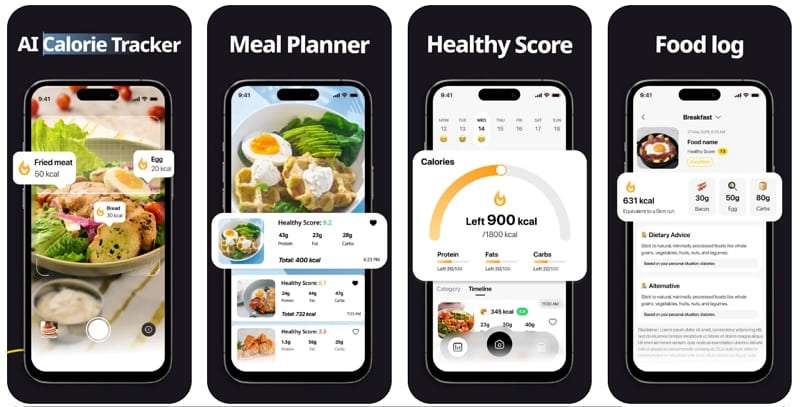
It provides customized meal plan recommendations based on your health and weight management goals. CalBye is a platform where users can focus on their health experience without worrying about complexity or data security, thanks to its high privacy settings. Using advanced AI and machine learning, it removes manual input fatigue and guesswork.
Key Features
- Global Food Database: CalBye features a comprehensive world food database encompassing a diverse range of cuisines, making it applicable to all types of users. This makes it possible to record meals and stay within your nutrition objectives accurately.
- Intelligent Recommendations: The application provides personalized dietary recommendations tailored to your age, weight, and health goals. This customized method ensures that your daily consumption aligns with your body's and overall wellness goals.
- AI-Powered Accuracy: CalBye reduces the manual input of food using advanced AI and machine learning. It eliminates the guesses and gives you the correct calorie and nutrient estimates depending on the meal you have.
- Meal Categorization: CalBye gives you the option to filter meals by their category, e.g., breakfast, lunch, or dinner. This can help the app recommend individualized choices, especially when paired with deficit calorie estimators.
- Daily/Weekly Progress Charts: A visual dashboard displays the details of calories and nutrient breakdown on a daily and weekly basis. With this kind of knowledge, one can track improvements, recognize eating habits, and maintain consistency over time.

2. Cronometer [iOS/Android]
This food nutrition tracker provides users with elaborate information on their diet. It features an extensive nutrient tracking system that covers over 80 micronutrients. Logging can be done fast with AI-enhanced photo entry, and it is compatible with other fitness applications, such as Apple Health, Fitbit, WHOOP, and more. They enable users to adjust their nutrition goals and provide a dedicated report dashboard to track their progress.
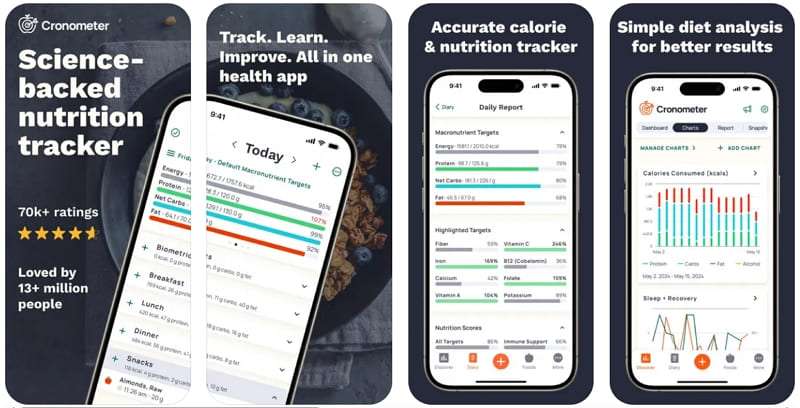
Limitations
- Importing historical knowledge and reconstructing records are limited in scope.
- The free plan does not include high-end analytics and custom diary capabilities.
3. Lose It! [Android/iOS]
Lose It! makes it easy to track nutrition through various simple logging features, such as barcode scanning and AI-assisted photo or voice meal logging. The nutrient tracking app calculates individual weight loss plans based on the profile and level of activity to provide personalized guidance. With the help of this tool, you can remain motivated through the social support in the form of challenge groups.
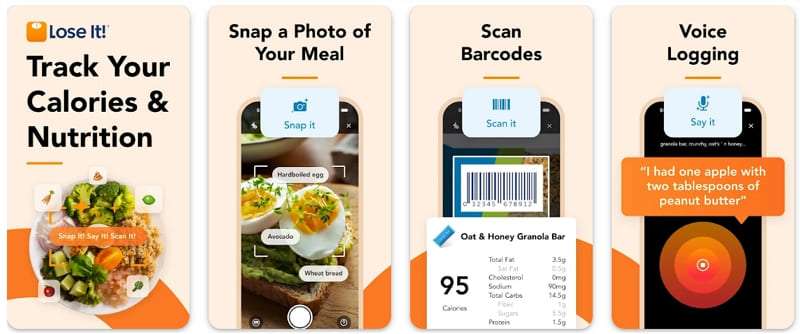
Limitations
- The food database may be missing certain international and ethnic foods.
- No individual coaching and nutrition instructions within the app.
4. Lifesum [iOS/Android]
This is a holistic nutrition tracker that provides custom diet plans, such as Keto, High Protein, Mediterranean, and Vegan. It monitors food, physical activity, water intake, and mood, providing customers with a comprehensive picture of their overall health. Lifesum gives insight into gut, metabolic, and mental health to add to diet tracking. Daily logging becomes easy and efficient with a food and exercise diary along with calorie and macro tracking.
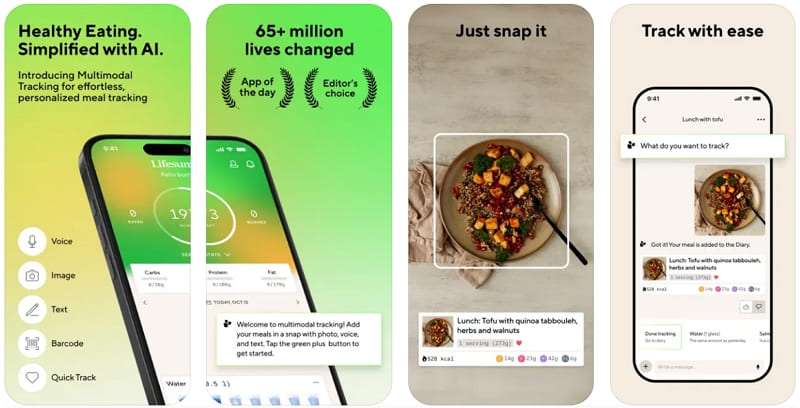
Limitations
- Minimal customization of favorite foods/exercises in terms of food logging.
- Automated reminders and notifications may be overbearing or annoying.

5. MyNetDiary [iOS/Android]
MyNetDiary is reputed to have an extensive, verified food database with 1.7 million items and 107 nutrients with which food can be accurately logged. It is compatible with AI-powered Voice Food Log and barcode scanning to enter foods immediately. In addition to this app, which tracks nutrients, it features an exercise tracker with over 500 activities and is integrated with health devices.
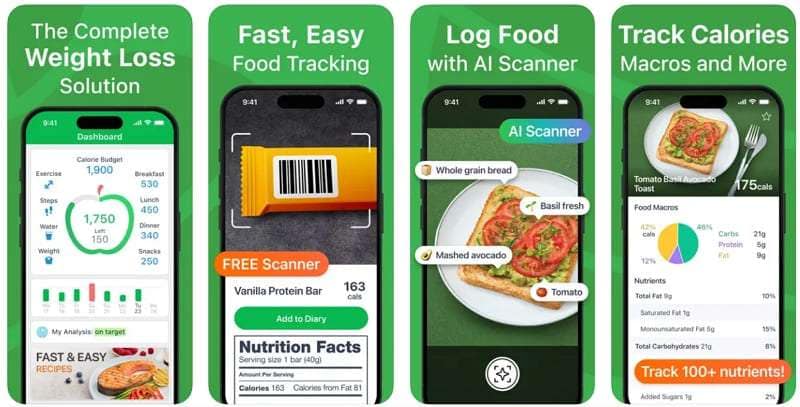
Limitations
- The free version restricts meal planning and recipe features.
- Users complain of data syncing problems with wearables.
6. Yazio [iOS/Android]
Yazio also offers several diet styles with calorie and macro tracking, designed to accommodate approaches such as the Keto and Intermittent Fasting diets. It features an extensive library of recipes and meal plans, complete with comprehensive nutrition information, making it easier to eat well. The food nutrition tracker app features a fasting tracker that includes reminders and daily logs to help users stay on track.
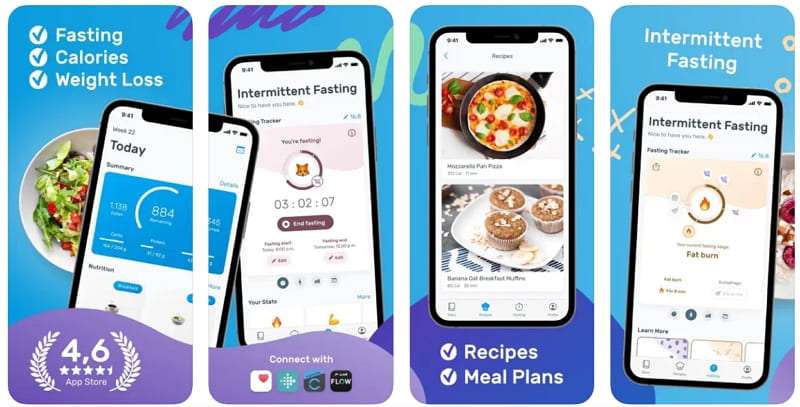
Limitations
- Reminders on fasting and streaks may be intrusive.
- The app has a less intuitive interface for new users.
7. Fooducate [Android/iOS]
Fooducate provides its users with food-grade analysis to help them understand the quality of their diet and assigns smart scores to products. This makes it easy to track with barcode scanning and enables comparison with healthier alternatives. The nutrition tracker also provides weight management, recipes, and diet tips. It also tracks allergies and food sensitivities, so people with special dietary requirements can use it.
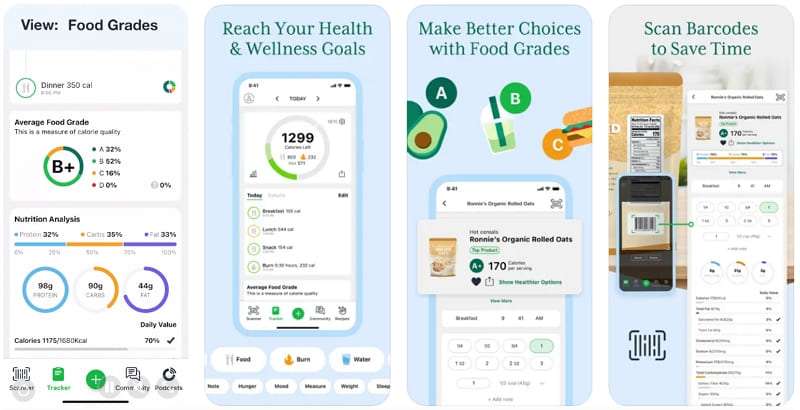
Limitations
- Serious nutrition and allergy analytics demand a high level of subscription.
- Users occasionally report crashes and app slowness.

8. WeightWatchers [Android/iOS]
The points system used by WeightWatchers is supported by science and is easier than manually calculating calories consumed. This nutrient tracking app offers custom meal plans and cooking directions. In-application coaching and a real-time support group make the user accountable and motivated. Fitness trackers and scales are integrated into this app, so that not only are activity levels reflected in the progress tracking, but also weight changes.
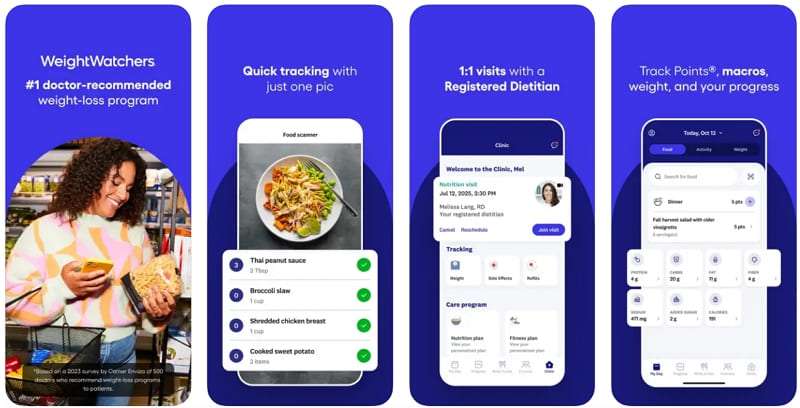
Limitations
- Tracking, coaching, and recipes are the advanced features that require subscriptions.
- The food database does not include particular local and international favorites.
9. Foodvisor [iOS/Android]
Foodvisor simplifies meal tracking with an AI-powered photo food journal that estimates nutrition data from meal photos. It provides users with custom coaching and nutrition plans, offering personalized guidance. Meal logging with portion analysis and automated logging saves time and is more accurate. The app that tracks nutrients can display a visualization of progress and send daily reminders to ensure users stay on track and accountable throughout their nutrition journey.
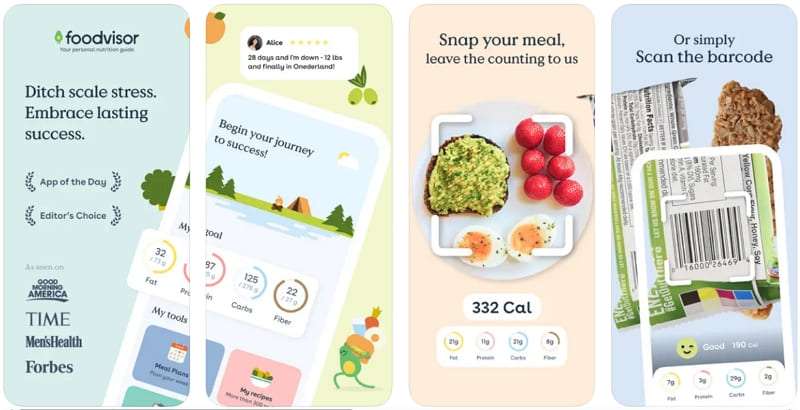
Limitations
- Photo recognition accuracy is not so accurate, particularly with mixed meals.
- Features of recipe and meal planning are less detailed than those of competitors.
10. MacroFactor [iOS/Android]
This app is flexible and allows for dynamic recommendations of macronutrients that adjust with user progress. The nutrition tracker also allows the integration of evidence-based coaching to ensure more structured guidance. Full-fledged analytics help users track energy and progress, making them suitable for any individual seeking to alter their nutrition and track outcomes with scientific accuracy.
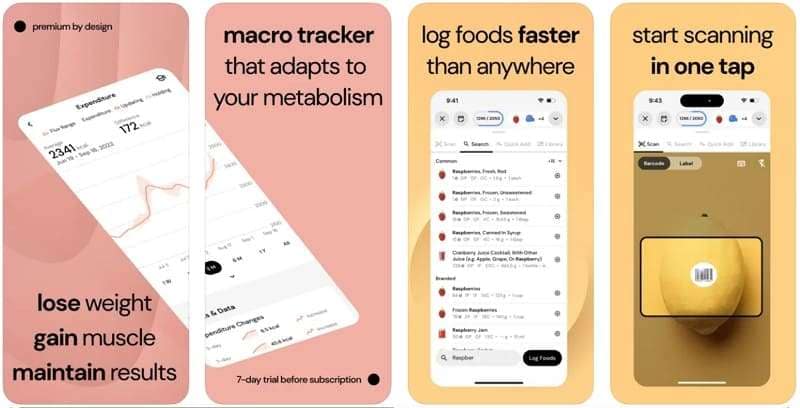
Limitations
- A macronutrition emphasis can overlook the importance of healthy nutrition education and holistic health.
- Lacks b group/social support characteristics, leaving users demotivated.
Conclusion
In conclusion, we have looked into the use cases that you can relate to to understand whether you need to start using a nutrition tracker application. Moreover, we have discussed around 10 apps, along with their limitations, so that you can choose the best one. Out of all the discussed options, the best choice for you is CalBye, as it allows you to track your calories effectively and efficiently.

FAQs
-
Which is the best nutritional tracker?
CalBye has been regarded as one of the best nutritional monitors due to its precision and easy design. It makes it easier to record calories, provides a more detailed analysis of nutrients, and assists users with setting achievable long-term diet and wellness management goals. -
How to track daily nutrition?
Many websites can help you track your daily nutrition by counting calorie intake and entering meals into apps such as CalBye or similar apps. With these tools, the work of calculating macros and nutrients is automatically done, so the right balance is maintained, and you stay on a healthier eating habit. -
What is my daily diet calculation?
The information you will get about your daily diet will be based on your age, weight, gender, and activity level. Nutrition tracker apps automatically calculate personal energy requirements in nutritional terms and give an individual a diet plan to meet fitness or health goals.


